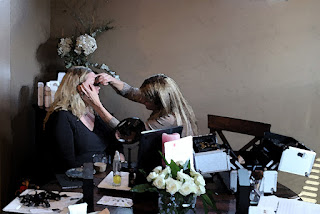If only wrinkles were always this cute…
I am committed to using safe products but sometimes there are things I wish I didn’t know, take Botox for example, there are days when I want to give it a shot (no pun intended) and erase these lines, but then I remember that it is a neurotoxin. Sigh. Retinol (Retinol/vitamin A, and its derivatives—retinyl palmitate, retinyl acetate, retinyl linoleate, and retinyl propionate) is the same for me. If you talk to most dermatologists, it’s what they recommend for erasing fine lines, spots, etc. etc. It’s become the cure all for skin problems. And most of the information online states that it is perfectly safe - but then there are the warnings about not going out in the sun, not using when pregnant or nursing, and possible skin irritation. I don’t know about you, but honestly if something is not safe when pregnant or nursing it’s not safe for me at all. In addition, both Canada and the European Union have restricted the use of retinol (the EU cites a “precautionary principle,” which means that if an ingredient has shown evidence of danger to human health or the environment, it takes preventative action). On its Skin Deep Database, the Environmental Working Group assigned retinol and its derivatives, retinyl palmitate, retinyl acetate, and retinyl linoleate, a rating of 9 on its hazard scale, linking safety concerns such as skin irritation and sun sensitivity. In the Retinol Technical information form published by BASF in April, 2011, too much retinol can be harmful: the main supplier for retinol in the cosmetics industry recommends usage not to exceed 0.1% due to its potential for skin sensitivity.
So imagine how excited I was to learn that there is a natural alternative called bakuchiol. In 2014, The International Journal of Cosmetic Science published a clinical study of retinol versus bakuchiol. The study concluded that bakuchiol mimics and sometimes exceeds the performance benefits of retinol.According to this study, retinol and bakuchiol do not have close structural similarities, yet t hey exhibit a similar gene expression profile, especially on certain key anti-aging genes and proteins, which is remarkable. Bakuchiol has several advantages over retinol, including a good safety profile, low potential for skin irritation, and performance under sunlight.
Bakuchiol is a plant-derived ingredient that has the benefits of a Retinol product without the potential harm. A recent article from Allure talks about this revolutionary ingredient: "It has a long history in medicine for its healing properties, including soothing rashes, calming redness, and healing cuts."
So why am I excited about it? Adding bakuchiol into your skin-care routine can lead to smoother texture, less hyperpigmentation, and restored elasticity – it helps increase cell turnover, resulting in collagen production and diminishing wrinkles. I've been using a new line for the past few weeks and my skin has never felt softer. If you want to learn more, please let me know!




Comments
Post a Comment